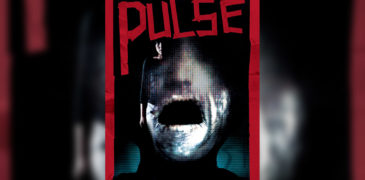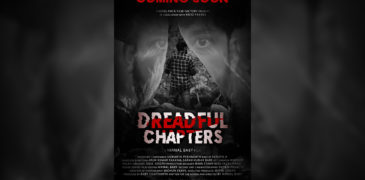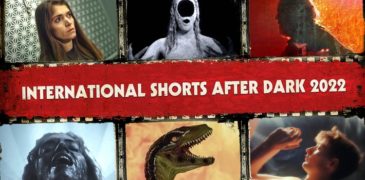Alongside their dedicated Shorts Showcase (both Canadian and International), the Toronto After Dark Film Festival offers bitesize extras for those attending. Each of the main features is preceded by a short film, resulting in a bevy of horror and comedy in equal measure. Here are our thoughts on those ten extra shorts.
Anything, Anything
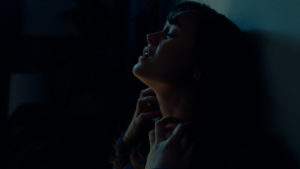
When Jordana (Maya Fuhr) drops in on Natalie (Hayley Orrantia), she worries her friend might be in trouble. A vase on the floor, a chunk torn out of the wall: everything points towards Natalie’s old problem rearing its ugly head again. Natalie (a squirrely, frightened Orrantia) reassures Jordana and sends her away. But of course, something is wrong. Emma Higgins’ short has promise. Imagining a demonic possession not simply as a metaphor for an abusive relationship but as the abusive partner itself is smart. Unfortunately, Anything, Anything never really goes anywhere. It feels static, restrained. The supernatural goings-on lack menace. The strength lies in Orrantia’s reactions to noises just offscreen, and the moments of uncertainty. It toys with ambiguity and double meaning. Jordana hopes Natalie isn’t struggling anymore, but with what? How much does she know? The film’s parts are strong, but the sum leaves much to be desired.
The Cradle
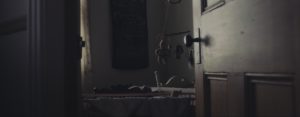
Written, directed, and co-produced by Massimo Meo, this three-minute thinker drops us into an old house. A woman (Sandra Trihey) moves from room to room: locking a door, setting a table, and ringing a bell to call in unseen, laughing children. Sylvaine Dufaux’s camera positions us at the silent woman’s waist, allowing us only glimpses and snatches of the full picture. We are not allowed to leave. The house and Adrienne Gantenberg’s beautiful costumes recall The Orphanage (2007), and the heavy keys, and solid locks in The Others (2001). Shades of these ghost stories promise something at least equally Gothic or grim. Meo’s short builds expertly towards its climax, his audience led almost by the hand towards the horror that awaits us; Maude Turcot works wonders with her Steadicam. Regrettably, the journey overshadows the destination. The Cradle asks more questions than it is prepared to answer, so much so that even its title seems wrong. Meo does, however, have a strong aesthetic vision, and the tension (up until the deflating reveal) is palpable.
Cruise
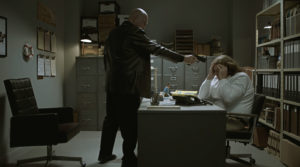
Mark (Simon Pond) is going to give away these free cruise tickets if it kills him – and it very likely will. His predecessor, Jake (Chad Andrews), has not long had his brains scrubbed off the walls. Now, it’s up to Mark to call random, unwilling citizens and foist upon them an all-expenses-paid trip. Sam Rudykoff (who writes, directs, and co-produces) revels in this capitalist nightmare: a bland office, a phone, and a telephone directory. Not to mention the digital screen counting down Mark’s three tries. Cruise satirises the much-maligned telemarketer, reimagining the role first as an almost German Expressionist tragedy in Jake (whose head explodes courtesy of JMS Special Effects Ltd.), and then as a comedy everyman in Mark, who would not be out of place in a Jud Apatow joint. The executioner (Ray James), responsible for making redundant those who fail the task, is a deliberate cliché: a strong, silent type, leather-clad and bald. Each nod of his head or jerk of his gun is accompanied by a dramatic sound effect. This gets old fast, but that may be the point. For a dark comedy, Cruise is not terribly dark or comedic, but it is a fun take on a depressing scenario.
Diggin’ A Hole
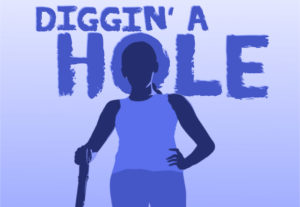
A woman (Karina Correa) digs a hole. A man (Jarrod Clegg) questions her. The setup to David Bragg’s short is simple. This dark comedy (emphasis on the comedy), adapted from a KW Little Theatre production, is a short and sweet tale that plays out like a sketch: set-up, pay-off. Andy Wolting frames it beautifully, with extreme wide shots centring the woman and her growing mound of earth. It helps that Fourfold Farms is in a picturesque location. Beyond that, there is little to say about Diggin’ A Hole. It is not a deceptively simple film; it is merely a simple film. It is neither memorable nor forgettable. Correa gives a fun performance, as do Clegg and Carlo Adamo, who appears towards the end. Diggin’ A Hole clocks in at just over four minutes with credits, so is in no danger of outstaying its welcome.
Dissós
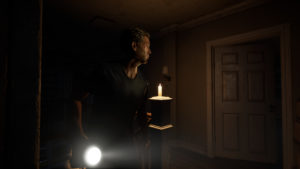
Created with the Unreal Engine and “shot on location in the Metaverse”, Dissós is perhaps the weakest offering. Steven Elford’s short plays like an indie horror game, complete with jerky animations, POV shots of a bobbing flashlight beam, and predictable jump scares. We follow an unnamed man, who wakes in the rain outside an old house. Confused, he ventures inside, where he makes a terrible discovery. Fans of Hideo Kojima and Guillermo del Toro’s P.T. will no doubt be aware of the slew of lazy clones. Dissós feels very much like one of those. It lacks weight: thematically, narratively, and in its animation. Our main character feels disconnected from the world around him, floating upstairs, and barely emoting until prompted by the animator. The plot, such as it is, is contrived and derivative, and the film is visually uninspired. Dissós is a novelty, but one that wears thin quickly.
Horse Brothers
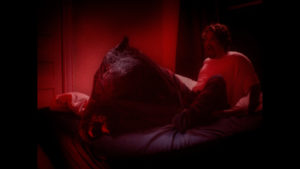
Fabian Velasco and Milos Mitrovic’s absurdist piece dares to ask the question: “What if The Godfather Part II were set on a horse ranch, and Fredo was a hapless electronics salesman, and Michael was convinced to do away with him by a horse who speaks in English with Italian intertitles?” The answer to that question is: The Horse Brothers. A strange, brilliant, at times hallucinatory film, The Horse Brothers follows Frodo and his brother, as well as a talking horse. The unnamed brother suspects Frodo of skimming money off their sales (rather than work on the ranch, Frodo flogs electronics). The horse (voiced by Guy Maddin and played by Anton the Horse) stokes distrust between them – but to what end? Markus Henkel’s cinematography captures an uncanny liminality. The sunlit sky feels wrong somehow, the heat palpable yet distant. At night, the Northern Lights bleed greenly across the sky, and the other brother’s nightmares are garish and terrible. The Horse Brothers screens ahead of the festival’s closing gala, and it earns its spot in the finale.
In The Dark
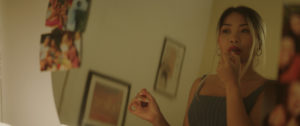
Directed and co-written by Bronson Allen, In the Dark is a horribly brilliant exploration of phobias and modern dating. Emily (Kimberly-Ann Truong, stealing the show) is a young woman who has been burned too many times. On her sixth date with James (Luke Humphrey), she discovers that he is afraid of the dark. Truong constantly walks a fine line between having standards and being judgemental. Humphrey is her perfect foil. His almost imperceptible flinch when Emily complains about other guys is perfectly pitched. In a genuinely moving scene, he opens up about his trauma. Behind him, Emily calculates her escape. It is a heartbreaking sequence: a man bearing his soul, and a woman deciding to leave him. The eventual horror is foreshadowed, both in Avery Kentis’ score and in a ham-fisted shot of a book on James’ shelf. This infrequent clumsiness hampers In the Dark’s success, but it remains a fascinating little film, with brilliant makeup and effects courtesy of Amber Finney and Elyssa Skode.
Les Dents De La Maison (Paws)
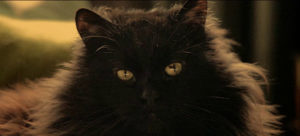
Les dents de la maison or Paws (the French actually translates to “The House’s Teeth”) features an evil cat. Hadrien Gass narrates in French while director and writer Austin Birtch plays his body: a hapless backpacker who agrees to catsit for a stranger. Said cat is, unfortunately for the guest, a demon. The film’s opening text establishes that the evil could never be a dog because they worship us. We worship cats. And maybe cats are evil, but evil never looked so appealing. Merlin (the cat) is a black fluffy joy, and we should be so lucky to be consumed by him. Shot by Nate Wilson, Victoria Bouthillier, and Andy Appelle, the film is chock full of intense zooms and Dutch angles, heightening the absurdity. Harrison Miles Hudson’s score treats the proceedings with intensity and respect. The film recalls the slew of pulpy animal-based horror from the 1970s – films like Pigs (1973), and Ken Greenhall’s novel Hell Hound (1977). Perhaps for obvious reasons, it also put this reviewer in mind of Stephen King’s 1977 story The Cat from Hell. Les dents de la maison is patently silly, with some perhaps intentionally shoddy effects, but its winning formula (great music, fun visuals, and a cat) cements it as one of the best of the bunch.
The Ratcatcher’s Daughter
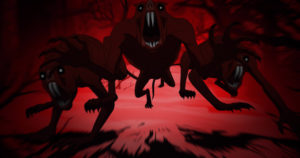
Created by Aljosha Klimov and Iouri Stepanov, The Ratcatcher’s Daughter is all over the place. Based on a story by Alexander Grin, this animated short takes place in 1920s Petrograd (now Saint Petersburg). Nina (voiced by Christie Stewart), the title character, bumps into Anton (Kevin Hanchard), a handsome revolutionary. Fleeing from the military, they uncover a hoard of inhuman, rat-like creatures beneath the city. The film is a collaboration between Lakeside Animation and Art Light Animation Studios. The main characters are styled after Don Bluth and put one in mind of Anastasia (1997), but they have none of his charms. The world feels flat, and the characters’ movements are sometimes stilted. Mostly monochromatic, scarlet splashes frequently: in crushed rats, and in soldiers’ armbands. At the centre of the film are the rats themselves, and their presentation is questionable at best. A secret, underground cabal hoping to establish a “New World” and drinking the blood of their enemies feels like a far-right conspiracy. But writers Matthew Lyon, Jim Bryson and Adam Jeffcoat (the latter two also direct) are less interested in messy politics, and more interested in the Ratcatcher himself (Lawrence Bayne), whom they imagine as a quipping action hero.
Conclusion
A mixed bag with high highs (The Horse Brothers, In the Dark) and low lows (The Ratcatcher’s Daughter, Dissós), these pre-feature shorts offer a variety of horrors to sink your teeth into.
We watched these shorts as part of the 16th annual Toronto After Dark Film Festival.
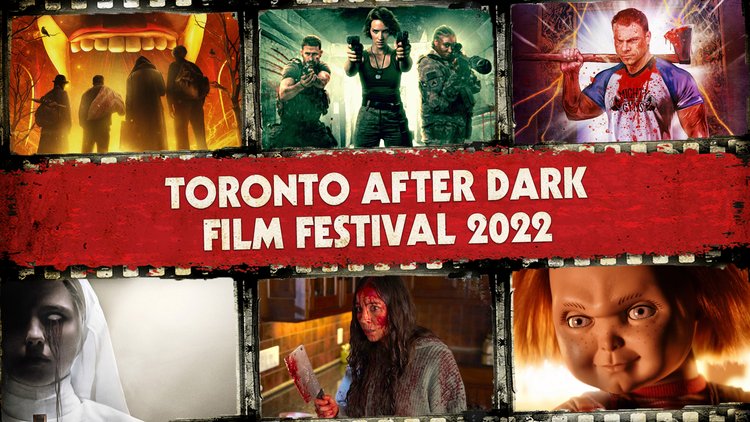
More Film Reviews
Here for Blood (2022) Film Review- Unhinged B-horror Ride [FrightFest]
Here for Blood (2022) truly lives up to its name, catering to those with an insatiable appetite for wicked and outrageous carnage. Yet, beneath this tongue-in-cheek horror, resides a familiar…
Censor Film Review (2021) – A Tale of British Video Nasties
Censor is an innovative psychological horror based in the UK in the 80s, with a story that both discusses and becomes the worst of video nasties – a melding of…
The Rebrand (2025) Film Review – Turning Queer Mommy Content Into Nightmare Fuel [Unnamed Footage Festival]
Who knew queer mommy vlog culture could be this unhinged? The Rebrand (2024), written and directed by Kaye Adelaide and with additional writing from Nancy Webb, is a wickedly…
Pulse (2001) Film Review – Isolation and Loneliness
It has now been 24 hours since I watched Pulse (2001), and I still find myself at a loss. It was a movie that I desperately wanted to enjoy, a…
Dreadful Chapters (2023) Film Review- Not so tasteful nor dreadful
There’s an inherent restlessness in the face of the unknown, perpetually stoking curiosity. Intentionally or otherwise, this very restlessness is what renders Dreadful Chapters a compelling viewing experience. Hailing from…
Toronto After Dark Film Festival 2022 – International Shorts After Dark Showcase
The international shorts on offer at this year’s Toronto After Dark Film Festival are among the strongest of the entire lineup. From bizarre Norwegian folk horror to a one-night stand…
Isabelle is a writer from the UK who enjoys alternative manga and horror films. When not writing, you can probably find Isabelle buying books or obsessing over Martin and Lewis.
![Here for Blood (2022) Film Review- Unhinged B-horror Ride [FrightFest]](https://www.grimoireofhorror.com/wp-content/uploads/2023/08/Here-for-Blood10-365x180.jpg)
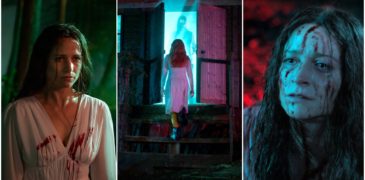
![The Rebrand (2025) Film Review – Turning Queer Mommy Content Into Nightmare Fuel [Unnamed Footage Festival]](https://www.grimoireofhorror.com/wp-content/uploads/2025/03/The-Rebrand-2024-Horror-Movie-Review-365x180.jpg)
